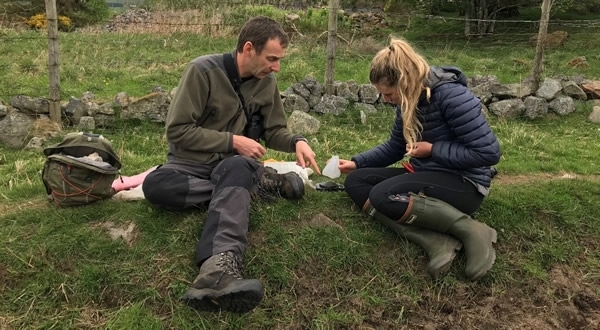
By Dr Dave Parish, Head of Scottish Lowland Research
It’s exciting times at Auchnerran just now as the wader breeding season is in full swing. There are lots of lapwing, oystercatchers, snipe, woodcock and curlew all busy with clutches and some young chicks, and Marlies and the team are equally busy trying to keep tabs on them all!
Last week we were visited by Andy Hoodless who lent an expert hand catching and ringing some lapwing chicks and an adult male curlew, as part of our ongoing efforts to better understand the factors impacting the survival and productivity of these declining species.
We know we are lucky at Auchnerran to have so many breeding pairs of all these species, but most people are not: the lapwing and curlew, for example, are red-listed with lapwing declining by 58% in Scotland between 1995 and 2015, whilst curlew have declined by 59%. The fate of the curlew has been well publicised of late with World Curlew Day and other events hoping to draw attention to the species’ plight, as the UK holds a large proportion of the world population.
 Male curlew ready for release
Male curlew ready for release
Our research programme at Auchnerran aims to help us understand how we might better support these species and reverse their fortunes. If we can figure out which features of the landscape at Auchnerran are particularly important to lapwing chicks, by radio-tagging them and following their progress from just after hatching, we will be able to help inform the next generation of agri-environment schemes in Scotland and the UK. Likewise with curlew: we hope to tag some breeding adults so we can follow them not only whilst they breed at Auchnerran but also after they leave: where do they go and what happens to them?
It is very likely that decreased breeding success has had a big influence on the population trends of the lapwing and curlew, and probably other waders too, and this research will tell us if this is indeed the case, which environmental factors are contributing to this and thus how we might begin remedying the situation. It is early days at Auchnerran but over the next few months and years we hope the situation will become clearer.